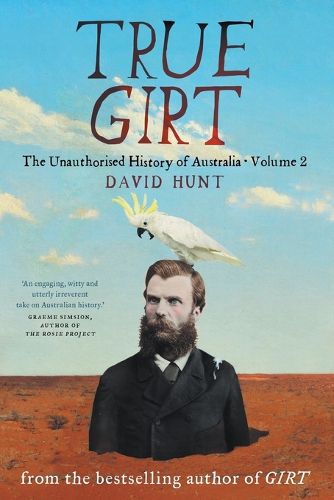Readings Newsletter
Become a Readings Member to make your shopping experience even easier.
Sign in or sign up for free!
You’re not far away from qualifying for FREE standard shipping within Australia
You’ve qualified for FREE standard shipping within Australia
The cart is loading…






Every purchase of this book includes a free Captain Moonlite tea towel. This offer is only available while stock lasts.
In this side-splitting sequel to his best-selling history, David Hunt takes us to the Australian frontier.
This was the Wild South, home to hardy pioneers, gun-slinging bushrangers, directionally challenged explorers, nervous indigenous people, Caroline Chisholm and sheep. Lots of sheep.
True Girt
introduces Thomas Davey, the hard-drinking Tasmanian governor who invented the Blow My Skull cocktail, and Captain Moonlite, Australia’s most famous LGBTI bushranger. Meet William Nicholson, the Melbourne hipster who gave Australia the steam-powered coffee roaster and the world the secret ballot. And say hello to Harry, the first camel used in Australian exploration, who shot dead his owner, the explorer John Horrocks.
Learn how Truganini’s death inspired the Martian invasion of Earth. Discover the role of Hall and Oates in the Myall Creek Massacre. And be reminded why you should never ever smoke with the Wild Colonial Boy and Mad Dan Morgan.
$9.00 standard shipping within Australia
FREE standard shipping within Australia for orders over $100.00
Express & International shipping calculated at checkout
Every purchase of this book includes a free Captain Moonlite tea towel. This offer is only available while stock lasts.
In this side-splitting sequel to his best-selling history, David Hunt takes us to the Australian frontier.
This was the Wild South, home to hardy pioneers, gun-slinging bushrangers, directionally challenged explorers, nervous indigenous people, Caroline Chisholm and sheep. Lots of sheep.
True Girt
introduces Thomas Davey, the hard-drinking Tasmanian governor who invented the Blow My Skull cocktail, and Captain Moonlite, Australia’s most famous LGBTI bushranger. Meet William Nicholson, the Melbourne hipster who gave Australia the steam-powered coffee roaster and the world the secret ballot. And say hello to Harry, the first camel used in Australian exploration, who shot dead his owner, the explorer John Horrocks.
Learn how Truganini’s death inspired the Martian invasion of Earth. Discover the role of Hall and Oates in the Myall Creek Massacre. And be reminded why you should never ever smoke with the Wild Colonial Boy and Mad Dan Morgan.
Like a good many others, I found the version of Australian history taught to me at school fairly dry and boring – nowhere near as colourful or scandalous as ancient Greece or Egypt (or my personal favourite, Anglo-Saxon England). David Hunt’s mission is to change that, and his popular 2013 book Girt has already brought an Australian sense of humour to Australian history.
Succinctly recapping the first volume with a darkly funny eight-panel comic strip, Hunt continues the absurdist comedy that is Australian history in True Girt. Broadly spanning the time period from the colonisation of Tasmania to the Gold Rush and the death of Ned Kelly, Hunt recasts the establishment of Hobart Town, the expeditions of Burke and Wills, and the founding of Melbourne as comedies of error, beset by drunkards, gamblers and perverts.
True Girt contrasts the differing approaches of land ‘acquisition’ between colonial Australia and New Zealand, and reveals the overwhelming preoccupation with sexuality that ended up affecting immigration, mining leases and bushranger culture. The book, Hunt says, is ‘shamelessly political’, rejecting Keith Windschuttle and other historians who downplay the role or status of Indigenous Australians in our country’s history – but Hunt’s first responsibility is to a good yarn. Littered with hilarious footnotes and asides, the parallels Hunt draws to remarkably recent politics suggest that, in Australia at least, history is bound to repeat itself.
For those not familiar with Girt, Hunt’s prose could verge on too flippant – the frontier wars between colonists and Indigenous populations, for instance, are at times recounted in a tongue-in-cheek manner that can seem jarring, given the subject matter – and there’s occasionally a sense that the author is trying to test the reader’s gullibility. But while Hunt skewers all players, his humour never punches down – the truth, overwhelmingly, is stranger than fiction, and the earnest moments are that much more meaningful when they come.